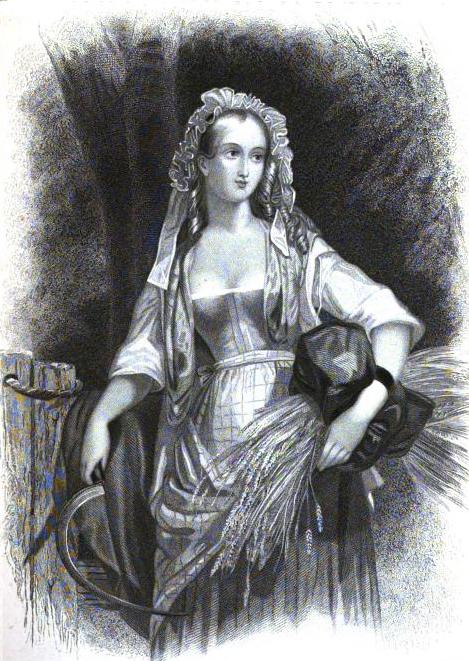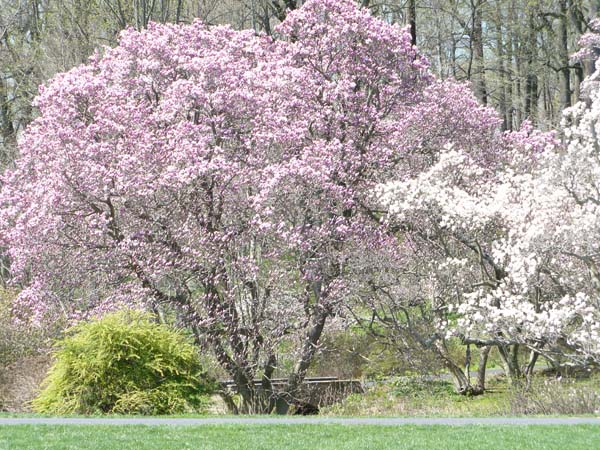Gleaning
September 28th, 2011
I could have sworn I already posted this illustration and poem, but it doesn’t seem to turn up in any of my site searches. Perhaps it was in the previous version of Circa 1850…before that unfortunate database crash in November 2010? Regardless, here it is again, from The Brilliant, a gift book for 1850, published by T(imothy) S(hay) Arthur, of Arthur’s Lady’s Magazine fame.

THE GLEANER.
Soft, and calm, and very still,
Fell the sunlight on the hill;
When the sultry noontide hour
Gave it most its strengh and power,
Like a glow of soft delight,
On a face with gladness bright;
Telling both of joy and rest,
Gentlest when the happiest.Even thus—as calm as fair,
Resting from the morning’s care,
Leaned, at noon, the dreaming maid,
Where the wood made deepest shade;
Calling back a dear delight,
Whispered to her over night,
‘Neath the boughs whose rustlings seem,
Mingled with her music-dream.May thy dreamings, maiden fair!
Ever such a glory wear—
Ever dwell a smile as meek
On thy yet unshadowed cheek.
Now thy life, like sunshine on,
Even when the dreams are gone;
And when golden youth is past,
Prove the loveliest at the last.
Gleaners were certainly romanticized in the 19th century. Take Tess Durbeyfield for example, who’s apparent innocence is highlighted by her work in the fields even as the presence of her doomed infant belies it. Or Philip Carey who finally takes Sally to his breast after watching her work at harvesting all day. And of course, there is Ruth, the biblical wife par excellence, who remains faithful to her mother-in-law even after she is widowed!
I have a plan to photography myself as a gleaner. Just as soon as I have time to make the costume, probably based on this illustration. I would also love to glean some day. But I have yet to meet anyone with a field of wheat, let alone one in which they would be willing to release me and my scythe.
This Is the Forest Primeval
June 25th, 2011
Practically the last book I read before leaving for California earlier this month wasn’t a book at all. It was a slim volume containing Henry Wadsworth Longfellow’s immortal poem, Evangeline.

Evangeline tells the sad tale of the Acadian expulsion of 1755, when the prosperous French settlers were turned out of Canada by their new British rulers and forced to sail down the Mississippi river to their eventual home in Louisiana. I’ve long reserved a soft spot for the Acadians, ever since I sewed and wore an Acadian folk costume for my fifth grade social studies project (yes, I’ve always been like this). But this was the first time I thought to read Evangeline. It was on sale for 50 cents at Housing Works; how could I resist?
Considered by some to be Longfellow’s most famous poem (sorry Elaine), Evangeline was written in 1847. That’s less than 100 years after the historical event that inspired it! Oh, for the civilized era when tragic events were commemorated by epic poetry rather than made-for-TV documentaries. Sure, I don’t know much more about the actual facts of the expulsion, or the political machinations that were its cause. But my sympathy has been stirred to a depth that film footage with a suave voice-over could never touch. And in the end, that’s really what matters.
And yes, I cried. If you wish to know what tickled my ducts, well, you’ll just have to read the poem and find out for yourself.
Rural Musing
April 29th, 2011
Suddenly, everywhere I look, the world is ripe and heavy with full-blown spring. I begin to hear the siren song of rocks and fields and streams and woods. Yet here I stay, trapped in an asphalt jungle. Someday soon, I shall break out of my prison and run wildly to bury my face in the verdure of a handy meadow.

TO THE RURAL MUSE.
“Smile on my verse, and look the world to love.”
Muse of the Fields! oft have I said farewell
To thee, my boon companion, loved so long,
And hung thy sweet harp in the bushy dell,
For abler hands to wake an abler song.
Much did I fear my homage did thee wrong:Yet, loth to leave, as oft I turned again;
And to its wires mine idle hands would cling,
Torturing it into song. It may be vain;
Yet still I try, ere Fancy droops her wing,
And hopeless Silence comes to numb its ev’ry string.Muse of the Pasture Brooks! on thy calm sea
Of poesy I’ve sailed; and though the will
To speed were greater than my prowess be,
I’ve ventur’d with much fear of usage ill,
Yet more of joy. Though timid be my skill,As not to dare the depths of mightier streams;
Yet rocks abide in shallow ways, and I
Have much of fear to mingle with my dreams.
Yet, lovely Muse, I still believe thee by,
And think I see thee smile, and so forget I sigh.Muse of the Cottage Hearth ! oft did I tell
My hopes to thee, nor feared to plead in vain;
But felt around my heart thy witching spell,
That bade me as thy worshipper remain:
I did so, and still worship. Oh! again.Smile on my offerings, and so keep them green;
Bedeck my fancies like the clouds of even,
Mingling all hues which thou from heaven dost glean!
To me a portion of thy power be given,
If theme so mean as mine may merit aught of heaven.For thee in youth I culled the simple flower,
That on thy bosom gained a sweeter hue,
And took thy hand along life’s sunny hour,
Meeting the sweetest joys that ever grew;
More friends were needless, and my foes were few.Though freedom then be deemed as rudeness now,
And what once won thy praise now meet disdain,
Yet the last wreath I braided for thy brow,
Thy smiles did so commend, it made me vain
To weave another one, and hope for praise again.With thee the spirit of departed years
Wakes that sweet voice which time hath rendered dumb;
And freshens, like to spring, loves, hopes, and fears,
That in my bosom found an early home,
Wooing the heart to ecstasy.I come to thee, when sick of care, of joy bereft,
Seeking the pleasures that are found in bloom.
O happy hopes, that Time hath only left
Around the haunts where thou didst erst sojourn!
Then smile, sweet Muse, again, and welcome my return.— John Clare, 1835
Great Moments in Poetry: Scott’s Heroines
December 15th, 2010
If I were to be a heroine, I’d want to be regaled in one of Sir Walter Scott’s poems.

The Lady of the Lake, 1810
Ellen Douglas, as she watches her aging father march off to save Scotland: “He goes to do what I had done, had Douglas’s daughter been his son!”
Read on…
